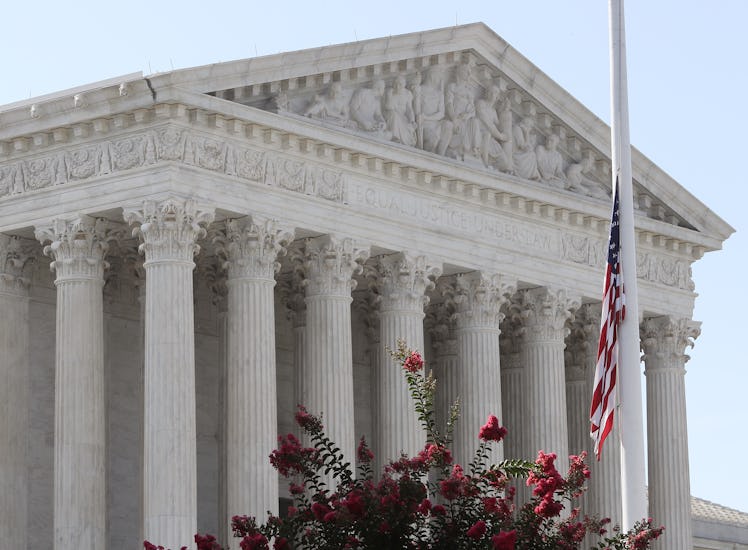
Supreme Court Justices Play A Pivotal Role In Impeachment
Over the past few weeks, the word "impeachment" has been at the tip of everyone's tongues. On Sept. 24, House Speaker Nancy Pelosi announced that the House of Representatives is launching an official impeachment inquiry into President Donald Trump, which the White House characterized as an attempt to "weaponize politics" in a statement to Elite Daily. However, the impeachment process can be lengthy, and a bit confusing to fully understand. So, for those who are wondering: Does impeachment go through the Supreme Court? Not exactly, but they're involved.
In a literal sense, the Supreme Court doesn't oversee or rule on impeachment, but members of the court are involved in the process. A president must be first impeached by a vote in the House of Representatives, which votes on articles of impeachment filed against a president. A majority vote passing any one article officially impeaches the president, although he or she isn't yet convicted. From the House, matters will be taken to a trial in the Senate, which votes on whether or not to convict (and thus remove a president from office). In the Senate, the Chief Justice of the Supreme Court presides over the trial. During the trial, the president is entitled to defense lawyers where witnesses can be called and evidence will be presented. Ultimately, the Senate must have a two-thirds majority vote to remove the president from office, and the Senate's vote is final and cannot be appealed by any court, per NBC News.
If the matter moves to the Senate, Supreme Court Chief Justice John Roberts would be presiding over the trial. Roberts was nominated as Chief Justice in 2005 by President George W. Bush, and has held the title since. However, even though Roberts will be presiding over the trial, the decision is ultimately up to the Senate, not him.
While the Supreme Court does have some involvement in the impeachment process, it'll take a while till it gets to that point. In order for the trial to reach the Senate, the House must first vote to put forward articles of impeachment. House Democrats have pushed for Trump's impeachment for months, but House Speaker Nancy Pelosi previously pushed back against the idea. Well, on Sept. 24, Pelosi announced that she would be launching an official impeachment inquiry into President Trump. "Today, I'm announcing the House of Representatives is moving forward with an official impeachment inquiry," Pelosi said. "I'm directing our six committees to proceed with their investigations under that umbrella of impeachment inquiry." In an emailed statement to Elite Daily on Sept. 24, White House Press Secretary Stephanie Grisham described the inquiry as Democrats' attempt to "weaponize politics" and added there was "nothing new here."
Due to the fact that the House of Representatives is currently controlled by the Democratic Party, there's a strong chance that the House will vote to put forward articles of impeachment. On Sept. 30, Senate Majority Leader Mitch McConnell told CNBC that if the House votes to move forward, the Senate will have "no choice" but to hold a trial to determine whether Trump will be removed from office. "I would have no choice but to take it up, based on a Senate rule on impeachment," McConnell told CNBC. However, the Senate is currently controlled by the Republican Party, so the likelihood that two-thirds will vote in favor of removing the president from office might be slim.
Impeachment can be a lengthy and confusing process, but it's important to have all the facts straight. When it comes to the Supreme Court, they might not be the deciding factor, but they'll definitely be there for the showdown. We'll just have to wait and see what happens.